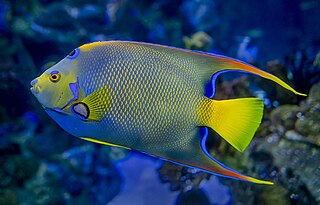
Marine angelfish are perciform fish of the family Pomacanthidae. They are found on shallow reefs in the tropical Atlantic, Indian, and mostly western Pacific Oceans. The family contains seven genera and about 86 species. They should not be confused with the freshwater angelfish, tropical cichlids of the Amazon Basin.
A yellowtail may be any of several different species of fish. Most commonly the yellowtail amberjack Seriola lalandi is meant. In the context of sushi, yellowtail usually refers to the Japanese amberjack, Seriola quinqueradiata. Other species called simply "yellowtail" include:

Holacanthus is a genus of marine angelfishes. The eight species are particularly abundant near volcanic rocks and coral islands. Some are highly valued as food, but even more so for aquaria, as all are brightly colored.

Centropyge is a genus of ray-finned fish, marine angelfish belonging to the family Pomacanthidae found in the Atlantic, Indian and Pacific Ocean. These species do not exceed 15 cm in length and live in haremic structures with one dominant male and multiple females. Although it is hard to identify their gender; females are often shorter and more round finned. Like many other reef fish and all marine angelfish, the species in this genus are protogynous hermaphrodite, meaning that they start their adult lives as females and the dominant individual in a group can change to a male within days. A reversal of this sex change is possible if the social status of the individual changes, it is however a process that requires much more time.

The lemonpeel angelfish, also known as the yellow angelfish, is a species of marine ray-finned fish, a marine angelfish belonging to the family Pomacanthidae. It is found in the Indo-Pacific region.

The twospined angelfish, also known as the dusky angelfish, or coral beauty, is a species of marine ray-finned fish, a marine angelfish belonging to the family Pomacanthidae. They are found in the Indo-Pacific.

The Japanese angelfish or Japanese pygmy angelfish, is a species of marine ray-finned fish, a marine angelfish belonging to the family Pomacanthidae. It is found in the western Pacific Ocean.

The queen angelfish, also known as the blue angelfish, golden angelfish, or yellow angelfish, is a species of marine angelfish found in the western Atlantic Ocean. It is a benthic warm-water species that lives in coral reefs. It is recognized by its blue and yellow coloration and a distinctive spot or "crown" on its forehead. This crown distinguishes it from the closely related and similar-looking Bermuda blue angelfish, with which it overlaps in range and can interbreed.

Chaetodontoplus meridithii, the Queensland yellowtail angelfish, Meredith's angelfish or yellow-finned angelfish, yellowtail angelfish, is a species of marine ray-finned fish, a marine angelfish belonging to the family Pomacanthidae. It is found off eastern Australia.

Chaetodontoplus duboulayi, the scribbled angelfish, is a species of marine ray-finned fish, a marine angelfish belonging to the family Pomacanthidae. This species is from the southwestern Pacific Ocean.

Centropyge tibicen, the keyhole angelfish, black angelfish, whitespot angelfish or puller angelfish, is a species of marine ray-finned fish, a marine angelfish belonging to the family Pomacanthidae. It is found in the Indo-Pacific region.

Centropyge fisheri, the orange angelfish, whitetail angelfish, damsel angelfish, yellowtail angelfish, Hawaiian flame angelfish, Fisher’s angelfish, Fisher’s dwarf angelfish or Fisher’s pygmy angelfish, is a species of marine ray-finned fish, a marine angelfish belonging to the family Pomacanthidae. It is found in the Indo-Pacific region.

The orangeface angelfish, also known as the blue vermiculate angelfish or maze angelfish, is a species of marine ray-finned fish, a marine angelfish belonging to the family Pomacanthidae. It is found in the Pacific Ocean.

Centropyge abei is a species of marine ray-finned fish, a small marine angelfish belonging to the family Pomacanthidae. It is found in the western Pacific Ocean.

The peppermint angelfish is a relatively small species of marine ray-finned fish, a marine angelfish belonging to the family Pomacanthidae. It is found in the Central area of the South Pacific Ocean, and is known to be native to the Cook Islands.
Centropyge nox, known commonly as the midnight angelfish or dusky angelfish, is a species of marine ray-finned fish, a marine angelfish belonging to the family Pomacanthidae. It is found in the Western Pacific Ocean.

Chaetodontoplus melanosoma, the black-velvet angelfish, brown angelfish, or phantom angelfish, is a species of marine ray-finned fish, a marine angelfish belonging to the family Pomacanthidae. It is found in the western Pacific Ocean.

Chaetodontoplus septentrionalis, the blue-striped angelfish and bluelined angelfish, is a species of marine ray-finned fish, a marine angelfish belonging to the family Pomacanthidae. it is found in the Western Pacific Ocean.
Chaetodontoplus ballinae, the Ballina angelfish, is a species of marine ray-finned fish, a marine angelfish, belonging to the family Pomacanthidae. It is endemic to eastern Australia.

Chaetodontoplus poliourus, the greytail angelfish, is a species of marine fish belonging to the family Pomacanthidae. It is similar to its sister species Chaetodontoplus mesoleucus, and the two were considered as being the same species for a long time. However, they can be readily distinguished by the color of their tails: C. poliurus has a grey tail, whereas C. mesoleucus has a yellow tail. The Greytail Angelfish can be found in inshore reefs and lagoons of the western Pacific, from Indonesia to Palau and Solomon Islands. It's rare in the aquarium trade, but highly sought after, and listed as Least Concern by the IUCN Red List.


























